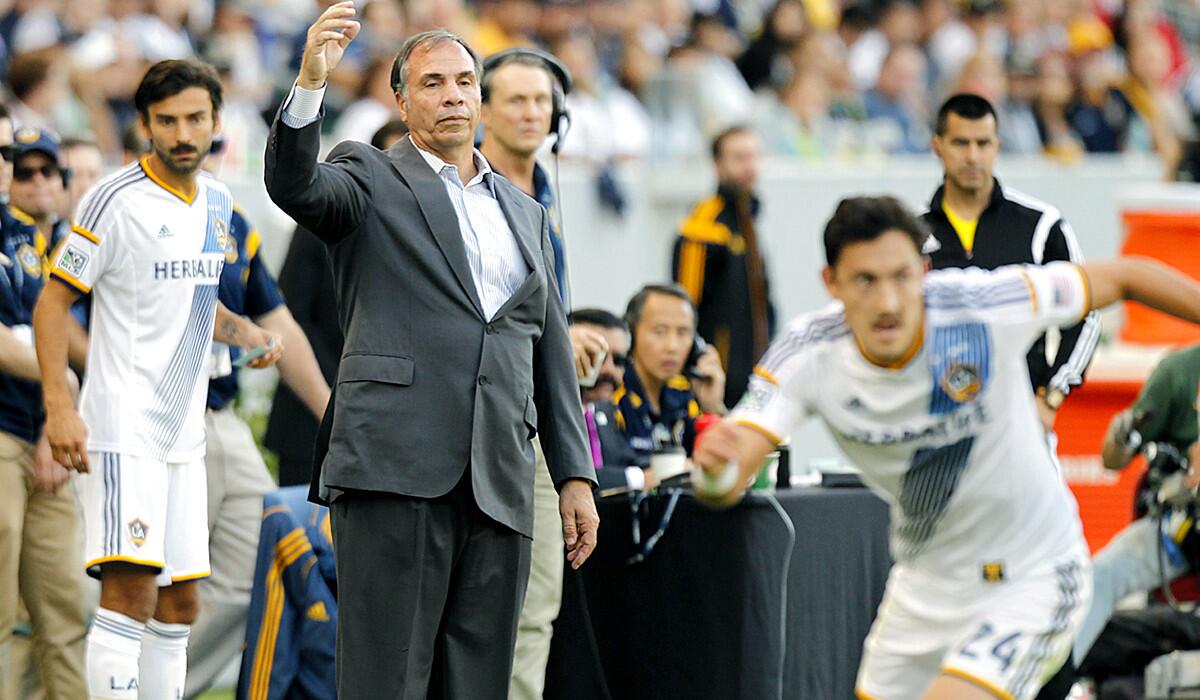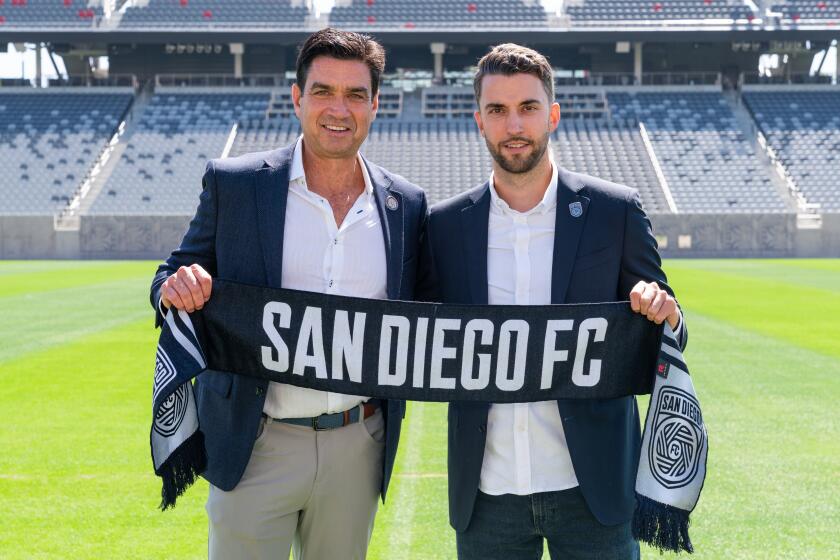Q&A with Galaxy Coach Bruce Arena

The Galaxy’s championship on Sunday marked a record fifth Major League Soccer title for Bruce Arena as coach, and it was his third title with the Galaxy. Arena, 63, has had a storied career, including coaching the U.S. team to the quarterfinals in the 2002 World Cup, as well as leading Virginia to five NCAA titles.
The Times interviewed Arena, who is also the Galaxy’s general manager, about the 2014 title run, what lies ahead and where MLS ranks among the world’s great soccer leagues.
Question: Every championship team has a different personality. What stands out about this year’s Galaxy team?
Answer: Our style of play. We were very attractive and unpredictable. We were a team that was good in both attacking and defending — and that’s fairly unique. We led the league in goals scored and goals against. And the character of the group throughout year. We had issues with Landon Donovan in May with the U.S. national team and him not being part of the World Cup. A.J. DeLaGarza losing his child. And the international responsibilities of our players, Robbie Keane playing for Ireland, A.J. for Guam, Omar Gonzalez with the U.S. team. These were all challenges for our group.
Q: In your Galaxy tenure, the team often starts slowly, then picks up momentum in the second half of the season. What triggered your second-half surge this year?
A: Our start was a little slow, but we were actually playing well but not getting the results. But I was always confident this group would turn it around. We got the right focus after the Manchester United exhibition, when we got trounced [7-0]. In all fairness, that was an exhibition and the timing was less than perfect for us — Manchester United was playing its first game with a new coach, and for them it was a big game, and we got spanked. The game after that in Seattle, we dismantled Seattle and we were a fairly confident group and went on a great run. We slowed down a bit at the end of the regular season. But there was no doubt the team was getting better, and I felt confident we could win the MLS Cup.
Q: Landon Donovan said in August he’d retire after the season. How did that impact the team? And did he play with more relief the rest of the season?
A: At the team end, it was obviously noted after his announcement. We were sensitive at the end of the year when U.S. Soccer decided to give him one last game. And we had a little tour of people saying goodbye to Landon. I actually think that slowed him down. He was playing quite well. Then all the pressure was on him, with different festivities at the end of the year. When the playoffs got here, we knew it meant more to him, and we were so happy it ended the way it ended.
Q: You have been coaching since your mid-20s. Has your coaching style changed?
A: Motivation is always something I’ve used. And this year there was enough there to get our attention and focus and to deal with some issues we had as a team. At this point with the Galaxy, we have such a great group of pros who come to work every day that I didn’t have to light a lot of fires under them all the time.
Q: You coached D.C. United to the first MLS title in 1996. Has the quality of play improved, and where does MLS rank among the world’s soccer leagues?
A: The quality of the league has improved, no question. Now we have 19 teams. We started with 10. We started out playing on a soccer field in Columbus, Ohio, that was only 57 yards wide. The San Jose field was crowned. We played on turf fields. We always seemed to play in football stadiums, Arrowhead in Kansas City, the football stadium in Tampa, the Rose Bowl. Now we have our own stadiums, established fan bases, you can see the games on TV. We still aren’t in the position where we can bring in a lot of top-level players, so that’s our next challenge, to get our resources in line. Where do we rank in the world? We’re certainly not of the stature of the EPL, La Liga, the Italian league or the German league. We’re a little bit below that. In 10 years maybe we can get in position to challenge those top four or five leagues around the world.
Q: Juergen Klinsmann has repeatedly said the U.S. national team would benefit if their players played in leagues overseas. Do you agree?
A: Every case you have to judge on its own individual merits. His general statement I don’t agree with. There are some players who have the opportunity to play in Europe and should do that. Most should be here — that’s my view. To build a strong national team, that has to come from domestic players and from a domestic league that is strong. I think what Juergen is saying is not that off-base. It’s our responsibility to develop in this country a pro league that continues to improve and allows us to have an environment to develop great players.
Q: There have been some reports that you might retire. Are you coming back next season?
A: I plan to be, unless something changes in the near future. Obviously, my days are not unlimited — I’m not doing this for 10 more years. How much longer, I’m not sure.
Q: What continues to motivate you as a coach, at age 63?
A: The same thing that motivates players. Athletic competition. And the league is still a challenge. The franchise is a challenge. I believe we are in the best sports market in the country. People demand that you win. You look around at the Dodgers now and the Angels. How the Lakers were. The Clippers. Kings and Ducks. UCLA and USC. It’s a remarkable sports market. To get any recognition you better be good — and damn good. That’s the challenge I have with this team that keeps me going every day.
Twitter: @BarryStavro








